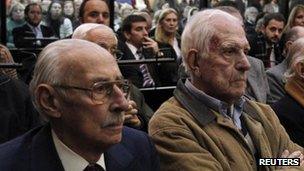Stolen baby hails 'liberating' verdict
- Published
Victoria Montenegro was one of Argentina's stolen babies - taken away from her parents just days after her birth
Victoria Montenegro lived for 25 years under the name Maria Sol Tetzlaff, until she knew the truth. She was one of Argentina's "stolen babies".
In 1976, only days after her birth, she was taken away by the security forces along with her parents Hilda Torres and Roque Montenegro, both left-wing activists.
The couple were arrested as part of the crackdown on political dissidents carried out by the military government at the time, which is known as the "dirty war".
Victoria's parents were taken to clandestine detention centres, where they were likely tortured and killed. Hilda was never seen again and Roque's remains were only identified a month ago - 36 years later.
But Victoria - who was less than a month old - was not handed over to her biological relatives. Instead she was taken by an army colonel and his wife. And, crucially, she was given a new identity.
Victoria only learned the truth when she became an adult.
'Healing society'
This was not an isolated incident at the time.

Jorge Videla (l) and Reynaldo Bignone (r) showed no emotion when the verdicts were read
The Argentine justice has now convicted two former Argentine leaders - and another seven people - of carrying out a systematic plan to steal babies from political prisoners.
Former ruler Jorge Videla was sentenced to 50 years in prison, whilst Reynaldo Bignone got 15 years.
Official records show that 105 of the "stolen babies" have now regained their real identity. In most cases their adoptive parents have faced criminal charges.
Human rights group Grandmothers of May Square believes there could be hundreds more.
This organisation has been demanding for years that the Argentine justice rule that there was a systematic theft of children.
And Thursday's verdict is the result of the group's long and hard work.
"This is justice. It has arrived. Remember that we started in 1996, and at that time we didn't know whether or not we would ever see this moment," says Estela de Carlotto, the president of Grandmothers.
Mrs de Carlotto believes that this verdict will be "healing for the Argentine society".
Those directly affected share her opinion.
"What has happened (the sentencing) is liberating," says Victoria Montenegro.
"With this verdict we can start repairing the damages caused by our history, even though this history still causes us pain," she adds.
Emotional debate
Victoria's story is an example of the complexities of what it means to be a "stolen baby".
In some cases the learning of the true identity results in the person embracing his biological relatives completely.
But this is not always the case.
Some either prefer not to know or when they do find out they remain with the parents who raised them - even if they were directly involved in the death of their biological parents.
Victoria's case is a mixture of both, which makes her story almost unique.
When her adoptive father told her that her parents were left-wing activists that he himself had helped to arrest, she replied: "I understand that you had to do it."
She even remembers feeling a strong fear of rejection from her adoptive parents because of her biological parents being left-wing dissidents.
"For 25 years I was strongly indoctrinated. I was told that all this happened because the country was at war against left-wing groups and that all those allegedly disappeared were liars," she says.
Victoria, or Maria Sol still then, even spoke in favour of her adoptive parents when they went on trial for her kidnapping.
But during her life as Maria Sol she felt "some things were not right".
"The worst years came when I started to come to terms with my situation and I had this huge internal emotional debate," she says.
"It took many years for me to process this. But in the end it was like a river that returned to its course."
Victoria's adoptive parents died several years ago without ever being convicted or jailed.
She admits that, despite everything, she "could not stop loving them".
"But I do know that - even if I could still have nice feelings for them - they stole something basic from me: The identity I was given by my real parents.
"Stealing a baby cannot be an act of love," she adds.
- Published6 July 2012
- Published29 April 2012
- Published22 December 2010
- Published6 July 2010